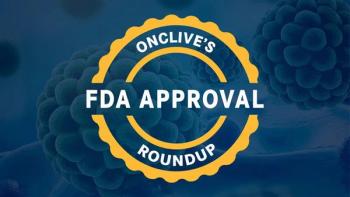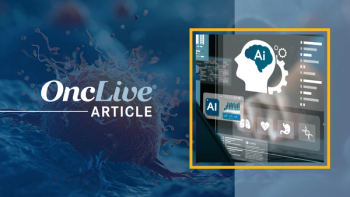
Biosimilar Interchangeability in Practice
Transcript:
Adam M. Brufsky, MD, PhD: The bigger issues that are involved I think that come up with this sort of thing really have to do with the interchangeability. And I think this is, we both are on the same page. We both have multidisciplinary committees that get together to make these decisions and hopefully there will be education around that, that the physicians understand that we’re making an interchange. That a lot of times we’re going to do it and they may not know it. You really have to get by-in. And I think that doctors need to know, they have to have that buy-in up front.
Kashyap Patel, MD: Of course.
Adam M. Brufsky, MD, PhD: You can’t just say, “Oh well, all of a sudden you’re getting whatever biosimilar of trastuzumab. Oh yeah, the pharmacist made that interchange.” That’s assuming the practice has a pharmacist. Some don’t have pharmacists, right, they have their nurses do the chemotherapy. The issue is that you have to have buy-in, and buy-in requires a real education about interchangeability. I think all the physicians need to understand what it means to be a biosimilar.
Kashyap Patel, MD: I think interchangeability is a very interesting point. Because sometimes if there’s a hesitancy on the part of the practice about, can they do it or not, payers will dictate it because there was 1 specific insurance company that mandated that you have to use Drug A versus Drug B. So even when we want to say, “I want to take all the new patients on, or I will take it half the way,” the payer will tell you, “Okay, come January 1, this is what you will get paid for.” So it becomes interchangeable irrespective.
Adam M. Brufsky, MD, PhD: Right, that’s tough. The problem in oncology that we have, and this is a real toughie I think for physicians, is you have a person on say biosimilar trastuzumab, she’s got stable disease. Maybe she’s stage IV NED [no evidence of disease]. She came in maybe with some lung metastases or liver metastases. They disappeared with chemotherapy and Herceptin/pertuzumab or trastuzumab/pertuzumab. And all of a sudden they’re gone off the originator. And the patient’s thinking, you’re thinking, “I don’t want to mess up.” You don’t want to change.
It’s interesting. So, in your practice are you doing everybody giving patients biosimilars, or are you just doing new starts?
Kashyap Patel, MD: No, we’re doing everybody. I’m very comfortable saying that the way FDA vets them out, I have seen the totality of evidence, and I’ve seen the studies that have been done, I’m very comfortable saying that if a biosimilar is approved, if it’s covered by the payer, if they’ve got supply chain guaranteed, and if they have the appropriate patient assistance program, I’ll move on to them right away.
Adam M. Brufsky, MD, PhD: In South Carolina are there mandatory interchangeability laws? Do you have those laws?
Kashyap Patel, MD: Not so far. In some states, everybody; it’s not gone through our state yet.
Adam M. Brufsky, MD, PhD: Do you want to explain that for our audience, what interchangeability laws are?
Kashyap Patel, MD: Sure. Some states actually have passed laws that, a couple of things. One is that you have to notify a patient when you are going to replace a product, and secondly is that you cannot do automatic substitution. Unfortunately, I think 10 states still have it. Fortunately, I think the majority of states don’t have that in place. Clearly, the fact that they’ve undergone appropriate vetting from the FDA, the fact that they’ve been approved, I’m very comfortable that we could change to the biosimilar at the time it becomes available. But there are some states where you may have to go through more bureaucratic nightmares. And again, it’s one of those realities of life that we have to live with.
Adam M. Brufsky, MD, PhD: Right. The other thing that maybe is not as important for oncology practices but is for bigger health systems, is the whole concept of getting a biosimilar indication in 1 disease; like Rituxan is a perfect example. The biosimilar rituximabs. Like in autoimmune disease, rheumatoid arthritis, and converting that over to lymphoma. Even though we have data in lymphoma….
Kashyap Patel, MD: Right.
Adam M. Brufsky, MD, PhD: But you could imagine, is it okay to use 1 indication to support another?
Kashyap Patel, MD: That’s extrapolation….
Adam M. Brufsky, MD, PhD: Correct, extrapolation.
Kashyap Patel, MD: Extrapolation, right, yes.
Adam M. Brufsky, MD, PhD: What do you think of that?
Kashyap Patel, MD: Well, I’m very comfortable with extrapolation because that’s actually one of the terms that the FDA has been fairly clear about. The challenge is, again, I think if you look into the bevacizumab, the Mvasi, in ovarian cancer, I think there’s been some, nothing to do with the FDA approval, it’s to do with the patent rights. The 2 companies that have the competing product in the market have some sort of legal wrangling going on to ensure that that indication right now is not covered.
Adam M. Brufsky, MD, PhD: Really? So it’s more of a patent issue as opposed to actually a medical issue.
Kashyap Patel, MD: It’s a patent issue.
Adam M. Brufsky, MD, PhD: Interesting. I didn’t realize that. Because our GYN [gynecologic] oncologists still have not used Mvasi yet. They’ve not used it.
Kashyap Patel, MD: I think the FDA label cannot say that simply because there is still some negotiation going on between the biosimilar and the reference producer.
Adam M. Brufsky, MD, PhD: Okay, got it.
Transcript Edited for Clarity






































